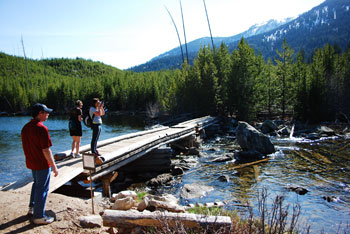
Since 2006, groups of Longwood University students and faculty have been setting out in May on an annual academic pilgrimage to Yellowstone National Park. Their mission is to seek out more than just magnificent scenery and some souvenirs. The "Longwood @ Yellowstone" program has been developed as a way for young people to gain a new perspective on what it takes to apply a university education to real-world problems.
"Longwood at Yellowstone is focused on engaging students in meaningful issues in their communities," said Dr. Carl Riden, associate professor of sociology, "by first engaging them in the Yellowstone ecosystem."
The adventure actually began several weeks ago as students from a variety of disciplines—from arts to science, geography to mathematics—began researching issues of concern in and around Yellowstone National Park. They looked into a variety of topics such as land and water conservation, wildlife management and business.
The actual trip to Yellowstone begins what faculty call "academic transfer."
"When many students leave for Yellowstone they think they have the answers," said Dr. Alix Fink, associate professor of biology and dean of the Cormier Honors College. "Then they start talking to ranchers and the people who actually live the experience and realize they really have more questions than answers."
For many students over the years, the Longwood at Yellowstone program has become a transformative learning experience, exposing them to different disciplines and perspectives in a truly unique environment. Just ask the many former students who take time out from their new careers and volunteer to organize and assist the current crop of adventurers. And then there are the students who after the experience have begun applying what they learned to solve problems at home and around the world. These projects include helping to develop a beach management program in North Carolina and creating materials to help encourage sanitation in Honduras.
"It’s about learning to apply multiple disciplines to one issue because that is how the world works," said Michael Mergen, assistant professor of art. "It’s real life and life-changing, especially for young people who may spend most of their time at a computer."
People at home can experience the Longwood at Yellowstone program as it is happening through photographs, online journal entries and videos that will be posted during the 2013 experience at www.longwood.edu/yellowstone

